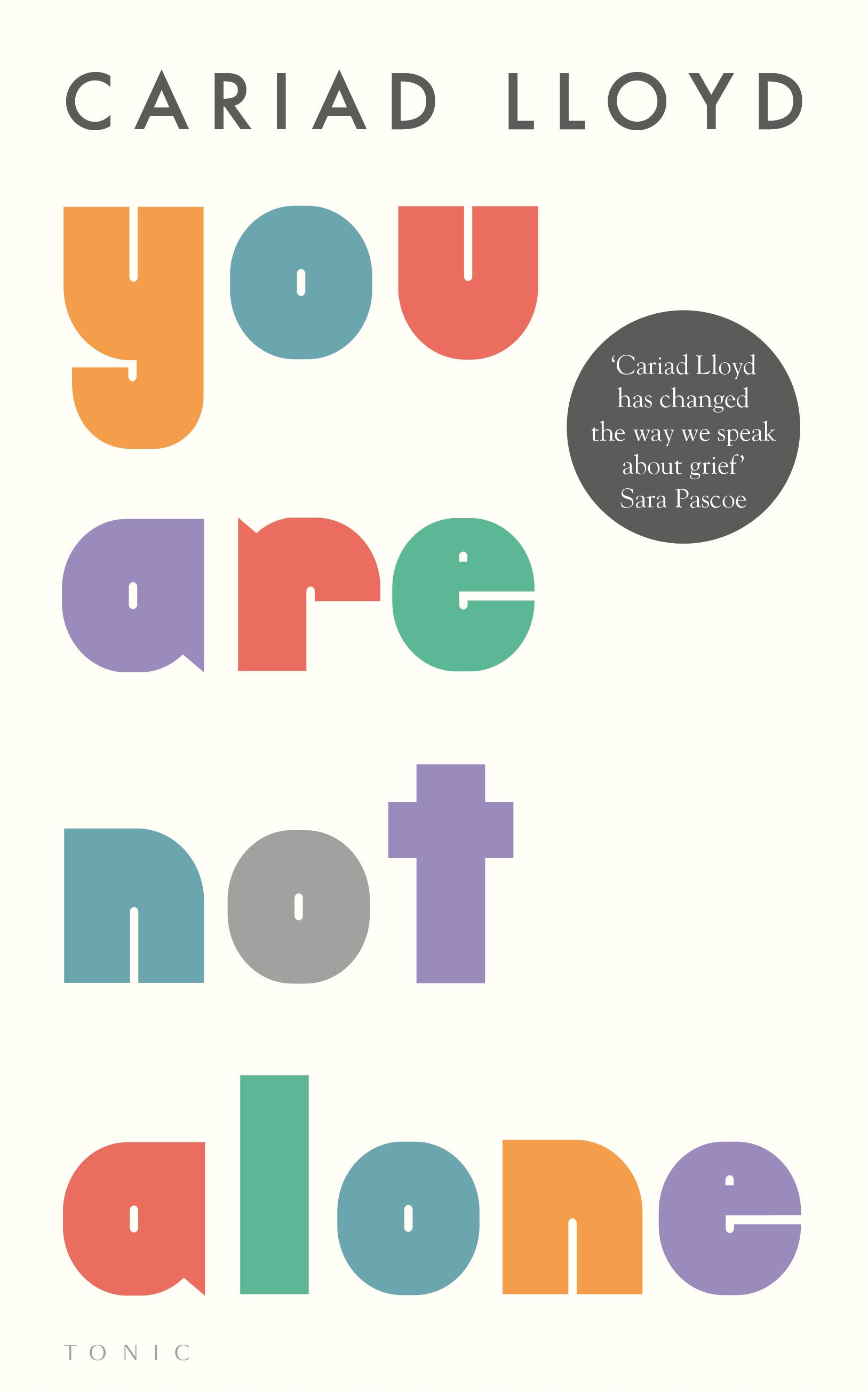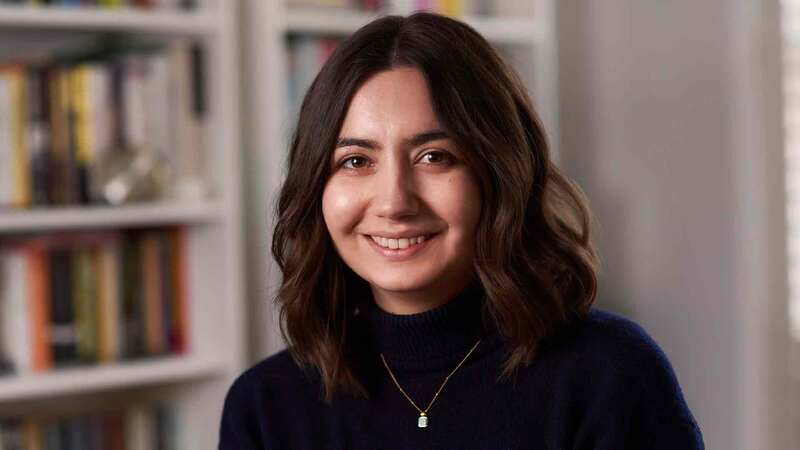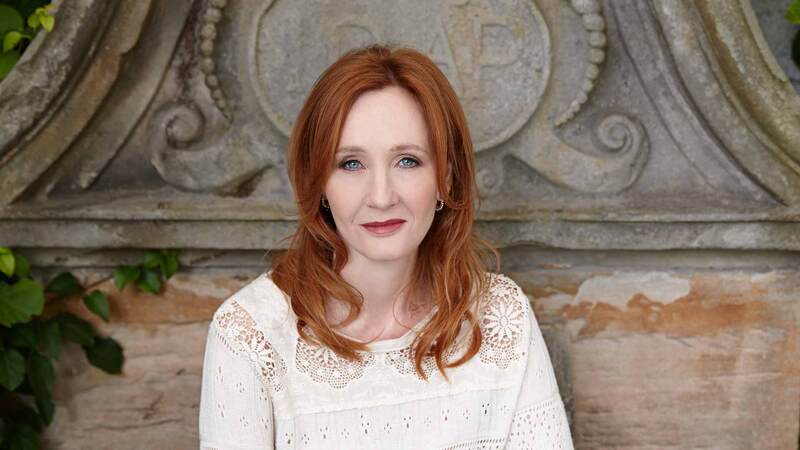You are viewing your 1 free article this month. Login to read more articles.
Cariad Lloyd discusses You Are Not Alone, her book about the complex process of grief
 Caroline Sanderson
Caroline SandersonCaroline Sanderson is a non-fiction writer, editor and books journalist. Her books include a travel narrative, A Rambling Fancy: in the F ...more
Actor, comic and host of hit podcast ‘Griefcast’, Cariad Lloyd has written a hand-holding guide to grieving that is both frank and compassionate.

Caroline Sanderson is a non-fiction writer, editor and books journalist. Her books include a travel narrative, A Rambling Fancy: in the F ...more
"I want my book to be useful above all. Because grief makes you feel so useless.” So says Cariad Lloyd—actor, comedian and a regular on TV shows such as “QI”—of her first book You Are Not Alone, the launch title for Tonic, Bloomsbury’s new imprint dedicated to “authors and books that help us to think, feel and live well”. Acquired following a big 16-way auction, it’s a frank, funny and deeply compassionate guide to grief that is also part memoir. For in 1998, when she was only 15, Lloyd lost her father Peter Fraser Lloyd to pancreatic cancer.
In the aftermath of this loss, the teenage Lloyd felt very alone with her maelstrom of emotions because nobody seemed to be talking about grief at all. “For many years, I lived with a grief I didn’t understand,” she writes. In fact, it took almost 20 years before she started to properly grapple with the impact of this seismic event in her young life, and this belated process led to the creation of a podcast called “Griefcast”. Drawing on her memories of the isolation she felt following her father’s death, “Griefcast” was conceived as a vehicle for honest and unhurried conversations about an experience that so many of us have in common but don’t always feel able to talk about. Since launching in 2016 it has featured the likes of Adam Buxton, Aisling Bea, Greg Wise and Robert Webb among more than 200 guests.
Within three years it had notched up 3.5 million downloads, and in 2018 won three Gold prizes at the British Podcast Awards, including Podcast of the Year.
We might all be talking about death now but if someone starts sobbing their heart out, we still feel deeply uncomfortable
You Are Not Alone distils the wisdom that Lloyd has gleaned from her podcast guests and intersperses it with reflections on her own experience of bereavement. Writing such a personal reflection on grief would be a testing assignment even in “normal” times, but as I discover from Lloyd when we meet at Bloomsbury’s office in central London, the timing of the book’s acquisition in 2019 soon became yet more challenging. “When I found out I was pregnant with my second child shortly after the book was acquired, I thought, ‘That’s OK, my daughter will be at nursery and my mum lives nearby, so I’ll get loads of help while I’m writing it.’ Then, five days after my son was born, the first lockdown happened. I came home from hospital with a newborn, my daughter’s nursery was closed and my mum couldn’t come around. So finding time to write the book was really tough, and what’s more, I found myself writing about grief in the middle of a pandemic, when thousands of people were dying. I had moments of thinking, ‘What have I done?’ But it was also fitting somehow, and it felt easier to talk to people about grief and death because they were so present every single day.”
Alone together
Serendipitously, I read You Are Not Alone almost in one sitting, on the birthday of my brother and only sibling, who died more than 30 years ago. It’s probably the best account I’ve yet read, not just of the immediate after-effects of the death of a loved one, but of what it’s like to carry your grief at their loss, year in, year out (“never let anyone tell you that time will dictate your emotion, it won’t”, writes Lloyd). Another standout quality of the book is the way it helps to validate the sheer disarray of feelings so characteristic of bereavement, a state of being that, in her own case, Lloyd dubs her “grief-mess”. While she acknowledges that there is now a “fantastic” range of resources and support that didn’t exist at the time her own father died, Lloyd still thinks we fail to properly engage with the reality and the longevity of grief. “I think we still struggle to let the mess of it in. We might all be talking about death now but if someone starts sobbing their heart out, we still feel deeply uncomfortable.”
I meet so many people who are stuck on trying to find the right way to do grief
While an admirer of the work of psychiatrist Elisabeth Kübler Ross, Lloyd laments the way that the so-called Five Stages of Grief, set out in Ross’ book On Death and Dying (and originally designed for those diagnosed with a terminal illness), have become so prevalent in conversations about grief, implying that it is a linear, finite process. Instead, her own experience was profoundly illuminated by the Dual Process model, developed by Margaret Stroebe and Henk Schut—or as Lloyd dubs it, “the two truths in my head”. “I think we are guilty as humans of wanting a single truth. So with a death, either we’re ‘over it’ or we’re ‘not over it’. But with grief you can actually feel great, and still feel pain as well. You can have weeks of weeping, then see a friend and feel brilliant. We need to get better at holding two such contrasting emotions at the same time.” This way of grieving also brings to mind the paradox inherent in one of my most remembered quotes about grief, from Helen Macdonald’s “H is for Hawk: “It happens to everyone. But you feel it alone.” Lloyd’s take on it is this: “While I’m not the only person who has lost a dad and lots of people have experienced similar feelings, my grief is my own and no one completely understands what it’s like. Yet I meet so many people who are stuck on trying to find the right way to do grief. I just want to remove any idea of ‘you should’, or ‘you’re meant to’.”
This approach also makes perfect sense when the emotions that follow the death of a loved one are so often complex. When I ask Lloyd about her father Peter, she paints a portrait of a larger-than-life character, whose fiery temper she admits to having inherited. “The only way I can describe him is to say, you just knew when he was in the room: he breathed loudly, he walked loudly, he ate loudly. He was a really interesting person, a curious person, but he wasn’t always easy. Because of my podcast, people assume that I felt nothing but love for my Dad, but actually ours was a complicated relationship, a mixture of good and bad.”
The passage of time
Lloyd also beautifully captures the way in which your relationship with the person who has died evolves over time, despite their lack of physical presence in your life. In her case, for example, wondering, once she became a mother in her thirties, about the kind of grandfather her dad would have been. “These sort of conversations you have in your head might lead you to grieve new things that at 15 you didn’t even think about. While that can be painful, it’s also a form of love and a form of connection.”
Extract
Grief is a huge, swirling tangled ball of wires – like the worst headphone knot you have ever seen. Unsolvable. You will spend your life untangling it, noticing strands, following them, almost thinking you’ve smoothed out all the sadness, and then a rush, a pain, a wave of grief will consume you again. We are always at the shore, we can watch as that grief tide goes out so far, but it will come back to us. We can get stronger muscles to hold it, we can sometimes hand it to others for moments of rest, but it is still our grief, it is a part of us….
I will ask you the questions that helped me understand my grief, and hopefully lead you to the answers that will make your grief knowable. I will also tell you my story, of how I have learnt to live with it. I will tell you I am happy: I still have my grief-mess, and yet I am happy. Some days it’s heavy, some days it’s so light that I don’t know it’s there. It changed me. It made me. I am happy.
I am sad. I am okay.
Along with its companionable, “hand-holding” humour, the true strength of You Are Not Alone lies in its realistic approach to grieving. Lloyd says: “This book is not a quick fix, because there are no shortcuts. You can’t run away from grief, because if you do, it will wait for years—it’s the most patient thing in your life. You have to go through it. But the good news, as I say at the end of every episode of the ‘Griefcast’ podcast, is that you are not alone. Other people have walked through that door, and even though they’re not happy every single day, they’re all right. And you will be all right somehow too.”










